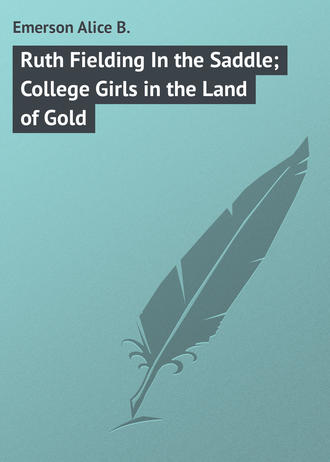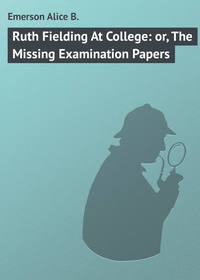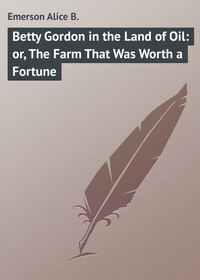 полная версия
полная версияRuth Fielding In the Saddle; College Girls in the Land of Gold
Of course, with Miss Cullam present, Edith was not likely to display her spleen quite so openly as she sometimes did when alone with the other Ardmore girls. But Ruth knew Helen would be so curious to know what Edith’s presence meant that “the fat would all be in the fire.”
It was really amazing that Edith was not discovered before they reached Chicago. After that her reservation was in another car. Then on the fifth night of their journey came something that quite put the sophomore out of Ruth Fielding’s mind, and out of Tom Cameron’s as well.
They had changed trains and were on the trans-continental line when the startling incident happened. The porter had already begun arranging the berths when the train suddenly came to a jarring stop.
“What is the matter?” asked Miss Cullam of the porter. She already had her hair in “curlers” and was longing for bed.
“I done s’pect we broke in two, Ma’am,” said the darkey, rolling his eyes. “Das’ jes’ wot it seems to me,” and he darted out of the car.
There was a long wait; then some confusion arose outside the train. Tom came in from the rear. “Here’s a pretty kettle of fish,” he said.
“What is it, Tommy?” demanded his sister.
“The train broke in two and the front end got over a bridge here, and, being on a down grade, the engineer could not bring his engine to a stop at once. And now the bridge is afire. Come on out, girls. You might as well see the show.”
CHAPTER VI – SOMEBODY AHEAD OF THEM
Even Miss Cullam – in her dressing gown – trailed out of the car after Tom. The sky was alight from the blazing bridge. It was a wooden structure, and burned like a pine knot.
Beyond the rolling cloud of smoke they could see dimly the lamps of the forward half of the train. The coupling having broken between two Pullmans, the engine had attached to it only the baggage and mail coaches, the dining car and one sleeping car.
The other Pullmans and the observation coach were stalled on the east side of the river.
“And no more chance of getting over to-night than there is of flying,” a brakeman confided to Tom and the girls. “That bridge will be a charred wreck before midnight.”
“Oh, goodness me! What shall we do?” was the cry. “Can’t we get over in boats?”
“Where will you get the boats?” sniffed Miss Cullam.
“And the water’s low in the river at this season,” said the brakeman. “Couldn’t use anything but a skiff.”
“What then?” Tom asked, feeling responsibility roweling him. “We’re not destined to remain here till they rebuild the bridge, I hope?”
“The conductor is wiring back for another engine. We’ll pull back to Janesburg and from there take the cross-over line and go on by the Northern Route. It will put us back fully twelve hours, I reckon.”
“Good-night!” exploded Tom.
“Why, what does it matter?” asked Helen, wonderingly. “We have all the time there is, haven’t we?”
“Presumably,” Miss Cullam said drily.
“But I telegraphed ahead to Yucca for rooms at the hotel,” Tom explained, slowly, “and sent a long message to that guide Mr. Hammond told you about, Ruth.”
“Oh!” cried Helen, giggling. “Flapjack Peters – such a romantic name. Mr. Hammond wrote Ruth that he was a ‘character.’”
“‘H. J. Peters,’” Tom read, from his memorandum. “Yes. I told him just when we would arrive and told him that after one night’s sleep at the hotel we’d want to be on our way. But if we don’t get there – ”
“Oh, Tom, there’s Ann, too!” Ruth exclaimed. “She will be at Yucca too early if we are delayed so.”
“I’ll send some more telegrams when we get to Janesburg,” Tom promised Ruth and his sister. “One to Ann Hicks, too.”
“Those people in the forward Pullman will get through on time,” Jennie Stone said. “I’m always losing something. ‘’Twas ever thus, since childhood’s hour, my fondest hopes I’ve seen decay,’ and so forth!”
Tom whispered to Ruth: “That sophomore from Ardmore will get ahead of us. She’s in the forward Pullman.”
“Oh, Edith!” murmured Ruth. “She was in that car, wasn’t she?”
They were all in bed, as were the other tourists in the delayed Pullmans, before the extra locomotive the conductor had sent for arrived. It was coupled to the stalled half of the train and started back for Janesburg without one of the party bound for Yucca being the wiser.
Tom Cameron meant to send the supplementary telegrams from that junction as he had said. Indeed, he had written out several – one to his father to relieve any anxiety in the merchant’s mind should he hear of the accident to their train; one to the guide, Peters; one to Ann Hicks to supplement the one already awaiting her at Yucca; and a fourth to the hotel.
But as he wished to put these messages on the wire himself, Tom did not entrust them to the negro porter. Instead he lay down in his berth with only his shoes removed – and he awoke in the morning with the sun flooding the opposite side of the car where the porter had already folded up the berths!
“Good gracious, Agnes!” gasped Tom, appearing in the corridor with his shoes in his hand. “What time is it? Eight-thirty? Is my watch right?”
“Ah reckon so, boss,” grinned the porter. “‘Most ev’rybody’s up an’ dressin’.”
“And I wanted to send those telegrams from Janesburg.”
“Oh Lawsy-massy! Janesburg’s a good ways behint us, boss,” said the porter. “Ef yo’ wants to send ’em pertic’lar from dere, yo’ll have to wait till our trip East, Ah reckon.”
Tom did not feel much like laughing. In fact, he felt a good deal of annoyance. He made some further enquiries and discovered that it would be an hour yet before the train would linger long enough at any station for him to file telegrams.
They spent one more night “sleeping on shelves,” as Jennie Stone expressed it, than they had counted upon. Miss Cullam went to her berth with a groan.
“Believe me, my dears,” she announced, “I shall welcome even a saddle as a relief from these cars. You are all nice girls, if I do say it, who perhaps shouldn’t. I flatter myself I have had something to do with molding your more or less plastic minds and dispositions. But I must love you a great deal to ever attempt another such long journey as this for you or with you.”
“Oh, Miss Cullam!” cried Trix Davenport, “we will erect a statue to you on Bliss Island – right near the Stone Face. And on it shall be engraved: ‘Nor granite is more enduring than Miss Cullam.’”
“I wonder,” murmured the teacher, “if that is complimentary or otherwise?”
But they all loved her. Miss Cullam developed very human qualities indeed, take her away from mathematics!
The party was held up for two hours at Kingman, waiting for a local train to steam on with them to their destination. And there Tom learned something which rather troubled him.
Telegrams were never received direct at Yucca. The railroad business was done by telephone, and all the messages sent to Yucca were telephoned through to the station agent – if that individual chanced to be on hand. Otherwise they were entrusted to the rural mail carrier. One could almost count the inhabitants of Yucca on one’s fingers and toes!
“Jiminy!” gasped Tom, when he learned these particulars. “I bet I’ve made a mess of it.”
He tried to find out at the Kingman station what had become of the final messages he had sent. The operator on duty when they arrived was now off duty, and he lived out of town.
“If they were mailed, son,” observed the man then at the telegraph table, “you will get to Yucca about two hours before the mail gets there. Here comes your train now.”
Had the girls not been so gaily engaged in chattering, they must have noticed Tom’s solemn face. He was disturbed, for he felt that the comfort of the party, as well as the arrangements for the trip into the hills, was his own particular responsibility.
It was late afternoon when the combination local (half baggage and freight, and half passenger) hobbled to a stop at Yucca. Besides a dusty looking individual in a cap who served the railroad as station agent, there was not a human being in sight.
“What a jolly place!” cried Jennie Stone, turning to all points of the compass to gaze. “So much life! We’re going to have a gay time in Yucca, I can see.”
“Sh!” begged Trix. “Don’t wake them up.”
“Awaken whom, my dear?” drawled Sally Blanchard.
“The dead, I think,” said Helen. “This place must be the understudy for a graveyard.”
At that moment a gray muzzle was thrust between the rails of a corral beside the track and an awful screech rent the air, drowning the sound of the locomotive whistle as the train rolled away.
“For goodness’ sake! what is that?” begged Rebecca, quite startled.
“Mountain canary,” laughed Helen. “That is what will arouse you at dawn – and other times – while we are on the march to Freezeout.”
“You don’t mean to say,” demanded Trix, “that all that sound came out of that little creature?” And she ran over to the corral fence the better to see the burro.
“And he didn’t need any help,” drawled Jennie. “Oh! you’ll get used to little things like that.”
“Never to that little thing,” said Miss Cullam, tartly. “Can’t he be muzzled?”
Meanwhile Tom had seized upon the station agent. He was a long, lean, “drawly” man, with seemingly a very languid interest in life.
“What telegrams?” he drawled.
Tom explained more fully and the man referred to a memorandum book he carried in the breast pocket of his flannel shirt.
“Yep. Three messages received over the ’phone from Kingman station. All delivered.”
“Good!” Tom exclaimed, with vast relief.
“Four days ago,” added the station agent.
That was a dash of cold water. “Didn’t you receive other telegrams in the same way yesterday?”
“Not a one.”
“Where have they gone, then?”
“I wouldn’t be here ’twixt eight and ‘leven. They’d come over the wire to Kingman, and the op’rator there would mail ’em. Mail man’s due any time now.”
“Well,” groaned Tom, “let’s go up to the hotel and see if they’ve reserved the rooms for us, if we are late.”
“And where’s Jane Ann Hicks?” queried Ruth, in some puzzlement. “She ought to be here to greet us.”
“What about that guide – the Flapjack person?” added Helen. “Didn’t you telegraph him, Tommy?”
“Who d’you mean – Flapjack Peters?” asked the station agent, interested. “Why, he lit out for some place in the Hualapai this forenoon, beauin’ a party of these here tourists – or, so I heard tell.”
There were blank faces among the newly arrived visitors from the East. But only Tom Cameron really felt disturbed. It looked to him as though somebody had got ahead of them!
CHAPTER VII – A MYSTERIOUS AFFAIR
“You needn’t be ‘fraid of not findin’ room at Lon Crujes’ hotel,” drawled the station agent. “He don’t often have more’n two visitors at a time there, and them’s mostly travelin’ salesmen. Only when somebody’s shippin’ cattle. And there ain’t no cattlemen here now.”
“Well, that is some relief, at least,” Helen said promptly. “Come on, Tommy! Lead the procession. Take Miss Cullam’s bag, too. The rest of us will carry our own.”
“How can we get the trunks up to the hotel?” asked Ruth, beginning to realize that Tom, to whom she had left all the arrangements, was in a “pickle.”
“Let’s see what the hotel looks like first,” returned Helen’s twin, setting off along the dusty street.
A dog barked at the procession; but otherwise the inhabitants of Yucca showed a disposition to remain incurious. It was not necessary to ask the way to Lon Crujes’ hotel; it was the only building in town large enough to be dignified by the name of “Yucca House.”
A Mexican woman in a one-piece garment gathered about her waist by a man’s belt from which an empty gun-sheath dangled, met the party on the porch of the house. She seemed surprised to see them.
“You ain’t them folks that telegraphed Lon you was comin’, are you?” she asked. “Don’t that beat all!”
“I telegraphed ahead for rooms – yes,” Tom said.
“Well, the rooms is here all right – by goodness, yes!” she said, still staring. Such an array of feminine finery as the girls displayed had probably never dawned upon Mrs. Crujes’ vision before. “Nobody ain’t run off with the rooms. We ain’t never crowded none in this hotel, ‘cept in beef shippin’ time.”
“Well, how about meals?” Tom asked quietly.
“If Lon gets home with a side of beef he went for, we’ll be all right,” the woman said. “You kin all come in, I reckon. But say! who was them gals here yesterday, then, if ’twasn’t you.”
“What girls?” asked Ruth, who remained with Tom to inquire.
“Have they gone away again?” demanded Tom.
“By goodness, yes! Two gals. One was tenderfoot all right; but ‘tother knowed her way ’round, I sh’d say.”
“Ann?” queried Ruth of Tom.
“Must have been. But the other – Say, Mrs. Crujes, tell us about them, will you, please?” he asked the Mexican woman.
“Why, this tenderfoot gal dropped off the trans-continental. Jest the train we expected you folks on. I s’pose you was the folks we expected?”
“That’s right. We’re the ones,” said Tom, hastily. “Go on.”
“The other lady, she come later. She’s Western all right.”
“Ann is from Montana,” Ruth said, deeply interested.
“So she said. I reckoned she never met up with the Eastern gal before, did she?”
“But who is the girl you speak of – the one from the East?” gasped Ruth.
“Huh! Don’t you know her neither?”
“I’m not sure I couldn’t guess,” Ruth declared. Tom kept his lips tightly closed.
“They made friends, then,” explained the woman. “The gal you say you know, and the tenderfoot. And they went off together this morning with Flapjack – ”
“Not with our guide?” cried Ruth. “Oh, Tom! what can it mean?”
“Got me,” grunted the young fellow.
“Why! it is the most mysterious affair,” Ruth repeated. “I can’t understand it.”
“Leave it to me,” said Tom, quickly. “You go in with the other girls and primp.”
“Primp, indeed!”
“I suppose you’ll have to here, just the same as anywhere else,” the boy said, with a quick grin. “I’ll look around and see what’s happened. Of course, that Flapjack person can’t have gone far.”
“And Ann wouldn’t have run away from us, I’m sure,” Ruth sent back over her shoulder as she entered the hotel.
Before the Mexican woman could waddle after Ruth, Tom hailed her again. “Say!” he asked, “where can I find this Peters chap?”
“The Señor Flapjack?”
“Yes. Fine name, that,” he added in an undertone.
“He it is who is famous at making the American flapjack —si si!” said the woman. “But he is gone I tell you. I know not where. Maybe Lon, he can tell you when he come back with the beef – by goodness, yes!”
“But he lives here in town, doesn’t he? Hasn’t he a family?”
“Oh, sure! He’s got Min.”
“Who’s Min? A Chinaman?”
“Chink? Can you beat it?” ejaculated the woman, grinning broadly. “Min’s his daughter. See that house down there with the front painted yellow?”
“Yes,” admitted Tom, rather abashed.
“That’s where Flapjack, he live. Sure! And Min can tell you where he’s gone and how long he’ll be away.”
The hotel proprietor’s wife disappeared, bustling away to attend to the wants of this party of guests that was apt to swamp her entire menage. Tom hesitated about searching out the guide’s daughter alone. “Min” promised embarrassing possibilities to his mind.
“Jiminy! we’re up against it, I believe,” he thought. “They’ll all blame me, I suppose. I ought not to have gone to sleep night before last and missed sending those last telegrams from Janesburg.
“Father will say I wasn’t ‘tending to business properly. I wonder what I’d better do.”
Ruth suddenly reappeared. She had merely gone inside to get rid of her bag and assure Miss Cullam that there were some matters she and Tom had to attend to. Now she approached her chum’s brother with a question that excited and startled him.
“What under the sun could have made her act so, do you suppose, Tom?”
“Huh? Who?” he gasped.
“That girl. She’s gone off with our guide and all.”
“Who do you mean? Jane Ann Hicks?”
“Goodness! I don’t understand Ann’s part in it, either. But she’s not the leading spirit, it is evident.”
“Who do you mean, then?” Tom demanded.
“Edith Phelps. Of course it is she. She arrived here on the trans-continental train on time. Tommy, she was in correspondence with somebody here in Yucca. Helen and I saw the envelope. And it puzzled us. Her being on the train puzzled me more. And now – ”
“Oh, Jiminy!” ejaculated Tom Cameron. “The mystery deepens. Rival picture company, maybe, Ruth. How about it?”
“I don’t think it’s that,” said Ruth Fielding, reflectively. “I am sure Edie Phelps has no connection with movie people – no, indeed!”
CHAPTER VIII – MIN
“Well, let’s go along and see Flapjack’s daughter,” Tom proposed. “I don’t want to make the acquaintance of any strange girl without somebody to defend me,” and he grinned at the girl of the Red Mill.
“Oh, yes. We know just how desperately timid you are, Tommy-boy,” she told him, smiling. “I will be your shield and buckler. Lead on.”
The house had a yellow front, but was elsewhere left bare of paint. It stood away from its neighbors and, as Ruth and Tom Cameron approached it, it seemed deserted. From other houses they were frankly watched by slatternly women and several idle men.
Tom rapped gently at the front door. There was no reply and after repeating the summons several times Ruth suggested that they try a rear entrance.
“Huh!” complained the boy. “This Min they tell of must be deaf.”
“Or bashful. Perhaps she is nothing but a child and is afraid of us.”
Tom merely grunted in reply, and led the way into a weed-grown yard. The fence was of wire and laths – the kind bought by the roll ready to set up; but it was very much dilapidated. The fence had never been finished at the rear and up on a scrubby side hill behind the house a man was wielding an axe.
“Maybe he knows something about this Flapjack Peters person,” grumbled Tom.
“Knock on the back door,” ordered Ruth Fielding briskly. “If that guide has a daughter she must know where he’s gone, and for how long. It’s the most mysterious thing!”
“It gets me,” admitted Tom, knocking again.
“Mr. Hammond said that he knew this guide and that he believed he was a fairly trustworthy person. He is what they call an ‘old-timer’ – been living here or hereabout for years and years. Just the person to find Freezeout Camp.”
“Well, there must be other men who know their way about the hills,” and Tom turned his back to the door to look straight away across the valley toward the faint, blue eminences that marked the Hualapai Range.
“It’s beautiful, isn’t it?” sighed Ruth, likewise looking at the mountains. “How clear the air is! See that peak away to the north? We saw it from the car window. That is the tallest mountain in the range – Hualapai Peak. Oh, Tom!”
“Yes?” he asked.
“That man looks awfully funny to me. Do you see – ?”
Tom wheeled to look at the person chopping wood a few rods away. The woodchopper wore an old felt hat; from underneath its brim flowed several straggly locks of black hair.
“Must be an Indian,” muttered Tom.
“It must be a woman!” exclaimed Ruth. “It is a woman, Tom! I’m going to ask her – ”
“What?” demanded the youth; but he trailed along behind the self-reliant girl of the Red Mill.
The woodchopper did not even raise her head as the two young folks approached. She beat upon the log she was splitting with the old axe and showed not the least interest in their presence.
Ruth led the way around in front of her and demanded:
“Do you know where Mr. Peters’ daughter is? We had business with him, and they tell us he is away from home.”
At that the woman in men’s shabby habiliments raised her head and looked at them.
“Jiminy!” exploded Tom, but under his breath. “It is a girl!”
Ruth was quite as curious as her companion; but she was wise enough to reveal nothing in her own countenance but polite interest.
The masquerader was both young and pretty; only the perspiration had poured down her face and left it grimy. Her hands were red and rough – calloused as a laboring man’s and with blunted fingers and broken nails.
When she stood up straight, however, even the overalls and jumper she wore, and the broken old hat upon her head, could not hide the fact that she was of a graceful figure.
“I beg your pardon,” said Ruth again. “Can you tell me where Miss Peters is?”
“I can tell you where Min Peters is, if you want to know so bad,” drawled the girl, red suffusing her bronzed cheeks and a little flash coming into her big gray eyes.
“That – that must be the person we wish to see.”
“Then see her,” snapped the other ungraciously. “An’ I s’pose you fancy folks think her a sight, sure ’nuff.”
“You mean you are Mr. Peters’ daughter?” Ruth asked, doubtfully.
“I’m Flapjack’s girl,” the other said, biting her remarks off short.
“Oh!” cried Ruth. “Then you can tell us all about it.”
“All about what?”
“How it happens that your father is not here at Yucca to meet us?”
“Huh! What would he want to meet you for?” asked the girl, shaking back her straggly hair.
“Why, it was arranged by Mr. Hammond that Mr. Peters should guide us into the Range. We are going to Freezeout Camp.”
“Wha-at?” drawled Min Peters in evident surprise. “You, too?”
Tom here put in a word. “I am the one who telegraphed to Mr. Peters when we were on the way here. It was understood through Mr. Hammond that Mr. Peters was to hold himself in readiness for our party.”
“Then what about them other girls?” demanded the girl, with sudden vigor. “They done fooled pop, did they?”
“I don’t understand what you mean by ‘those other girls,’” Ruth hastened to say.
“Why, pop’s already started for the hills. I I dunno whether he’s goin’ to Freezeout or not. There ain’t nobody at that old camp, nohow. Dunno what you want to go there for.”
Ruth waived that matter to say, eagerly:
“How many girls are there in this party your father has gone off with?”
“Two. He ‘spected more I reckon, for there’s a bunch of ponies down in Jeb’s corral. But the girl that bossed the thing said you-all had backed out. It looked right funny to me– two girls goin’ off there into the hills. And she was a tenderfoot all right.”
“You mean the girl who ‘bossed’ the affair?” asked Tom, curiously.
“Yep. The other girl seemed jest driftin’ along with her. She knowed how to ride, and she brought her own saddle and rope with her. But that there tenderfoot started off sidesaddle, like a missioner.”
“A ‘missioner?’” repeated Ruth, curiously.
“These here women that sometimes come here teachin’ an’ preachin’. They most all of ’em ride sidesaddle. Many of ’em on a burro at that. ’Cause a burro don’t never git out of a walk if he kin help it. But I’ve purty near broke my neck teachin’ four or five of the ponies to stand for a sidesaddle – poor critters. I rid ’em with a blanket wrapped ’round me to git ’em used to a skirt flappin’,” and she spoke in some amusement.
“Well,” Ruth said, more briskly, “I don’t exactly understand those girls going without us. One of them I am sure is our friend. The girl who evidently engaged your father is not a stranger to us; but she was not of our party.”
“What in tarnation takes you ‘way into them mountains to Freezeout?” demanded Min Peters. “There ain’t a sign of color left there, so pop says; and he’s prospected all through the range on that far side. Why, he remembers Freezeout when it was a real camp. And I kin tell you there ain’t much left of it now.”
“Oh!” cried Ruth. “Have you seen it?”
“Sure. I been all through the Range with pop. He didn’t have nobody to leave me with when I was little. I ain’t never had no chance like other girls,” said Min, in no very pleasant tone. “Why I ain’t scurcely human, I reckon!”
At that Ruth laughed frankly at her. “What nonsense!” she cried. “You are just as human and just as much of a girl as any of us. As I am. Your clothes don’t even hide the fact that you are a girl. But I suppose you wear them because you can work easier in men’s garments?”
“And that’s where you s’pose mighty wrong,” snapped Min.









